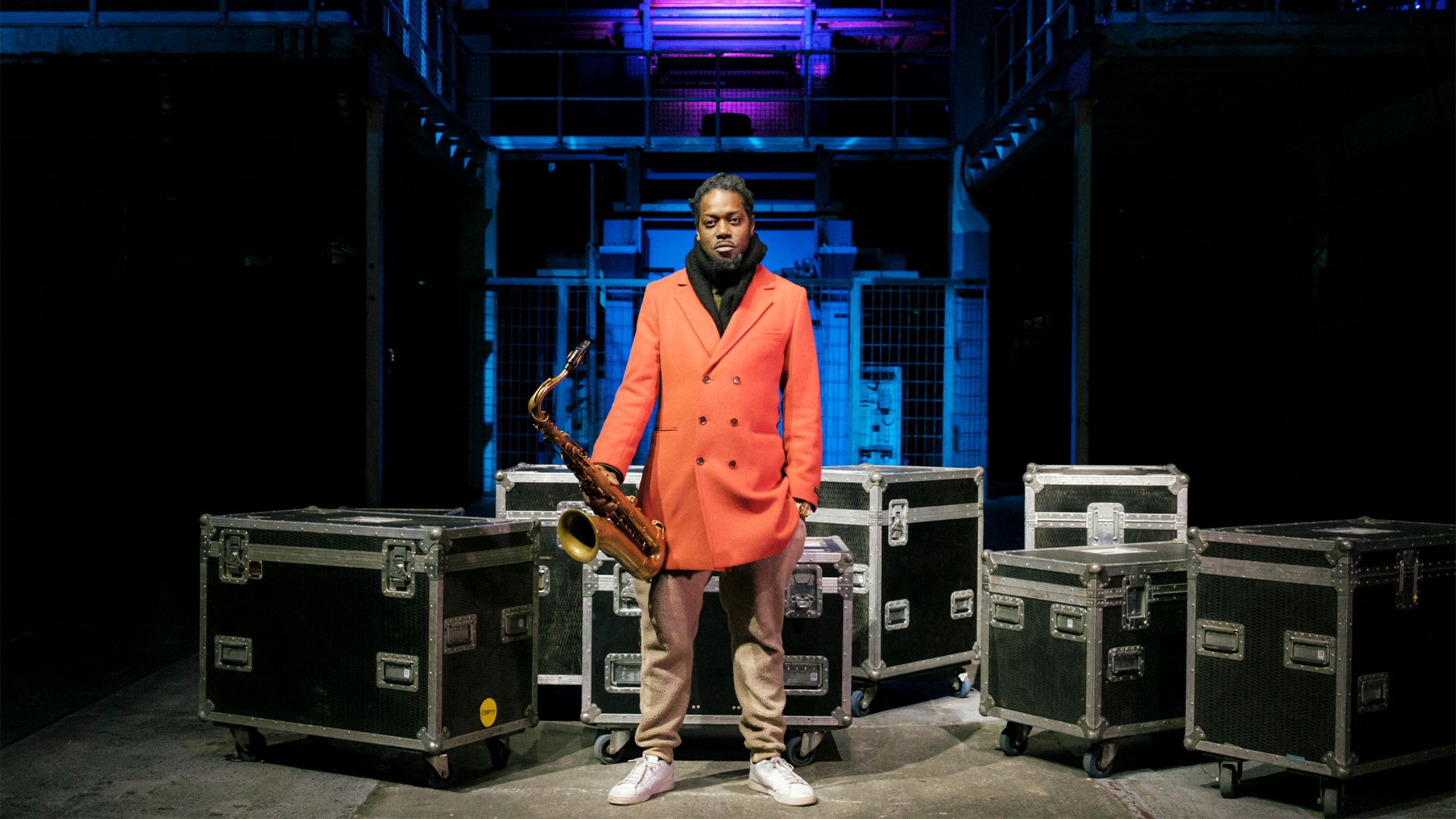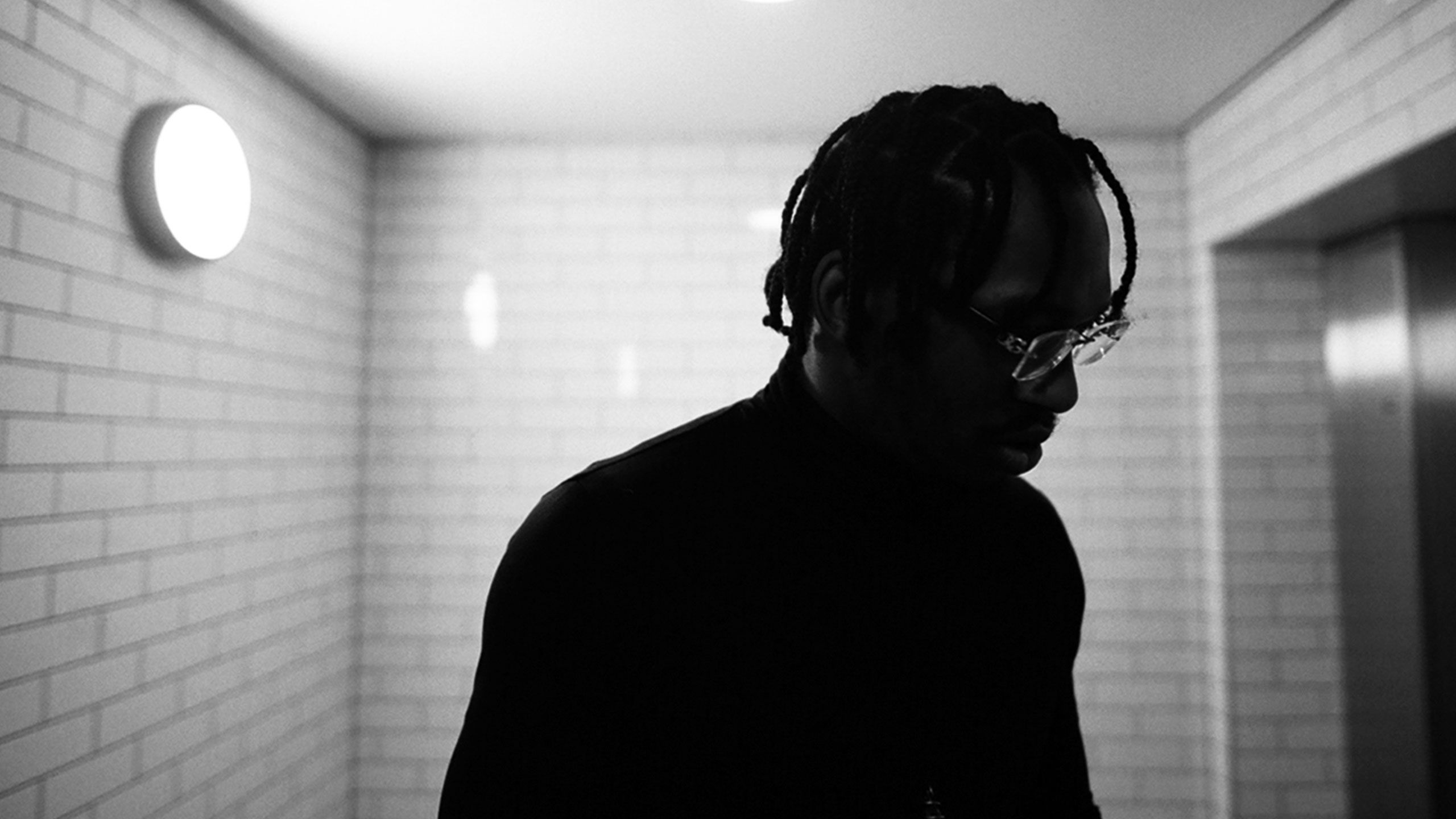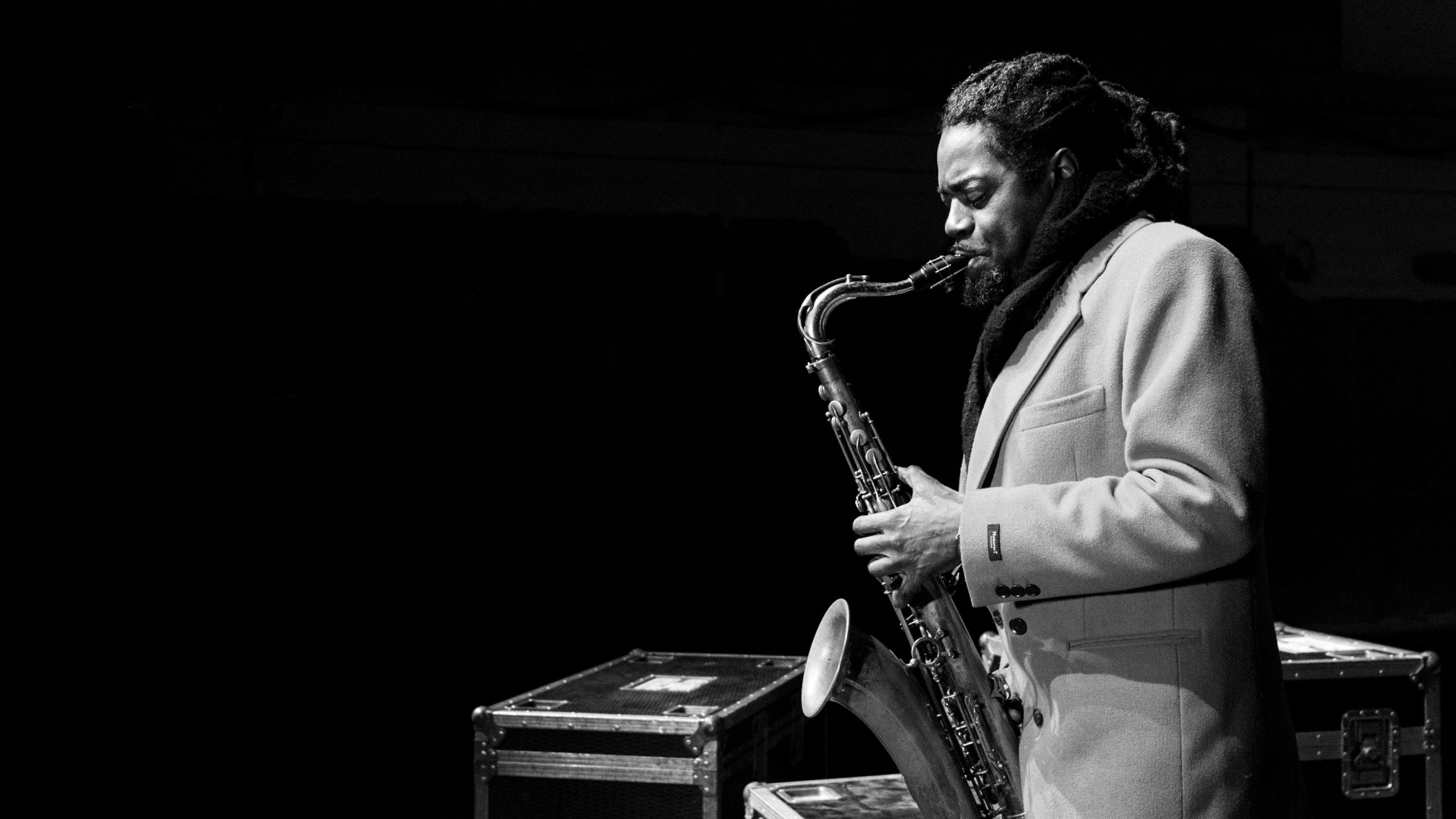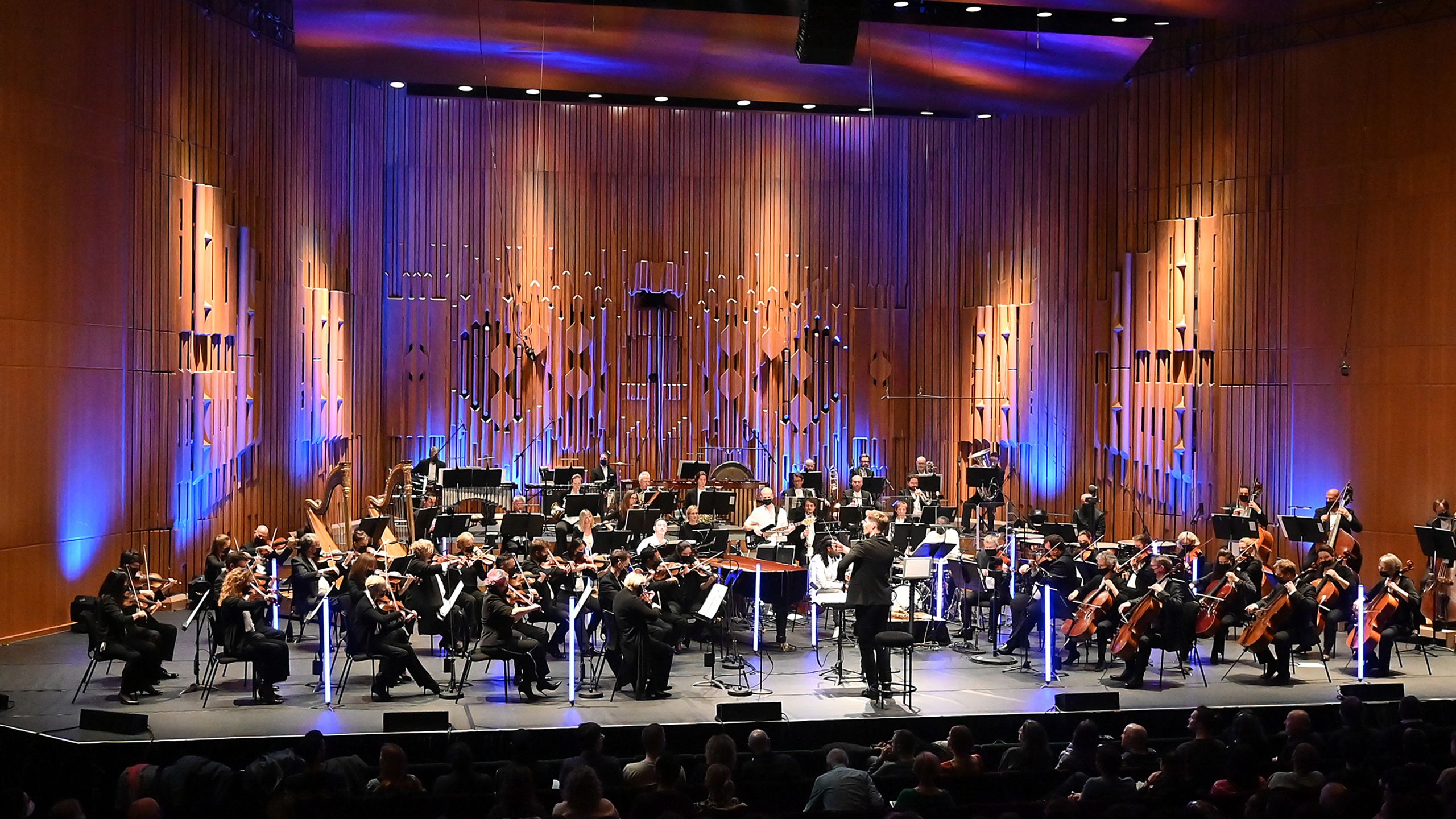LSO & Soweto Kinch
Thursday 16 March 2023
Printworks
Doors 7pm | Starts 8pm

The collaboration between the London Symphony Orchestra and Soweto Kinch began in 2019 with The Black Peril, a body of work co-commissioned by the LSO and Serious, workshopped at LSO St Luke's and first performed at EartH by a 14-piece band and a quartet of LSO string players. The year 2020 brought lockdown, Black Lives Matter protests, culture wars … Out of that, in 2021, came White Juju, also co-commissioned by the LSO and premiered at the EFG London Jazz Festival at the Barbican in November that year by the full London Symphony Orchestra, Soweto Kinch and a jazz quintet. Now the project has been released to the world by LSO Live on digital and vinyl, and tonight it comes to the vast space of Printworks.
Tonight's concert is co-promoted by the LSO and Broadwick Live
Please note that this performance will be accompanied by visuals, including images of the Ku Klux Klan, George Floyd’s funeral, riots, protest and police action – some footage of which includes violence – which some audience members may find upsetting.

Brother May
opening set
Brother May is a charismatic London-based MC, songwriter and producer, known for his off-the-wall lyricism and energetic live performances. As a founding member of the CURL collective (alongside Coby Sey and Mica Levi) he's a gifted collaborator and improviser, spontaneously sculpting ideals of freedom and expressivity into new and innovative forms.
Find Brother May on Instagram, Twitter, Facebook and Bandcamp.

White Juju
Soweto Kinch
✒️ 2020–21 | ⏰ 74 minutes

Introduced by Soweto Kinch
White Juju is an artistic response to a year of pandemic, racial animus and culture wars, inspired by events as diverse as Covid-19, Black Lives Matter protests and the toppling of statues. The music melds jazz and hip hop with classical music: drawing broad inspiration from European folklore, the African Diaspora and toxic national myths to create a uniquely contemporary tone poem. Written for jazz ensemble and chamber orchestra, White Juju references everything from bird song to unicorns, police brutality, 18th-century Baroque and the black Pentecostal church. It draws a sonic trail through the surreal year of lockdown, playfully creating danceable and layered works, intended to provoke thought and break through an old form of divisive sorcery.
HOW WHITE JUJU BEGAN
The piece began as a series of memoirs and essays responding to virulent culture wars during 2020 and following a tour of historic British sites. #BlackPeril2020 was an online festival, created as venues and performers faced an uncertain future during the first lockdown. I visited a number of British cities with a small group of musicians and dancers, creating socially distanced artistic responses, commemorating the race riots of 1919–21. We travelled to working class communities often excluded from jazz and ‘the arts’ by exorbitant ticket prices or perceived elitism, and often still defined by immigrant populations living precariously 100 years later. We saw evidence of a toxic nationalism etched into the civic architecture, statues of powerful colonialists and gratuitous flags festooned from grand buildings.
White Juju grew out of a number profoundly affecting conversations with the musicians, dancers, local historians and kindred artists and academics such as Jason Moran, Kehinde Andrews, Nicholas Payton and Lowkey whilst developing #BlackPeril2020. There was a powerful suspicion that the current receptivity to the black experience sparked by George Floyd’s murder may only be momentary. Once hashtags had run their course and profile pictures were no longer black squares, the stultifying status quo would return. It felt increasingly important to use this window, to capture the moment and record our unfiltered experiences.
COMPOSING WHITE JUJU
Composing this music was profoundly cathartic, discovering how entrenched our national myths are on both sides of the Atlantic and how a form of ‘white juju’ was constantly employed to distract, distort the truth and disorientate the masses. 2020 was a year in which it became impossible to deny the supranational and systemic nature of racism. I wanted to capture how it felt at the time, before the distorting lenses of memory and shame could be applied.
The piece is centred around ten new works created for a jazz quartet and orchestra. Beginning with the deafening silence of quarantine in 2020, it explores how the diverse sounds of the past years are tangentially connected by a shared history. From a bird call in Central Park, to a statue of a slaver crashing into Bristol’s River Avon. The music that you will hear oscillates between unity and division. Recognisable sounds unite people, traversing geographical and cultural divides. Much like Covid-19, they momentarily dissolve national boundaries. Conversely there is a sonic world which deliberately evokes division, distraction and terror, using widely understood ‘classical’ code to evoke establishment order and intimidation.
The piece is deliberately danceable, whilst intentionally subverting the perceived elitism of orchestral music. It asks how cultural hierarchies originate and why audiences often feel constrained by stuffy and exclusionary norms. It creatively explores the tension between classical music, when it is perceived as an impenetrable elitist art-form, and the seismic popular impacts of jazz and hip hop. Are these distinctions based on truth or mere perception?
The creative process has become both therapy and a rubric for navigating a bewildering culture war. This project was inspired by the need to reframe the debate, liberating artists and audiences from this confusing world.
Soweto Kinch
saxophone, vocals & composer
Award winning alto-saxophonist and MC Soweto Kinch is one of the most exciting and versatile musicians in both the British jazz and hip hop scenes. Undoubtedly one of the few artists in either genre with a degree in Modern History from Oxford University, he has amassed an impressive list of accolades and awards on both sides of the Atlantic, including two MOBO Awards for Best Jazz Act (2003, 2007) and a Mercury Prize Nomination for Album of the Year (2003). More recently, Kinch extended his work in music media, becoming the main presenter for BBC Radio 3’s Jazz Now, and fronting the BBC Four documentary Jazzology (2018). His current series for BBC Radio 4, Rethinking Music, explores the crisis in music education today and what it means for musical life in the UK in the 21st century. He has been awarded an Honorary Associateship at Hertford College, Oxford (2018) and the Royal Academy of Music (2020).
Find Soweto Kinch on Instagram, Twitter, Facebook and online.

The London Symphony Orchestra
The London Symphony Orchestra strives to inspire hearts and minds through world-leading music-making. We were established in 1904, as one of the first orchestras shaped by its musicians. Today we're ranked among the world's top orchestras. We are Resident Orchestra at the Barbican, and we reach international audiences through touring, online broadcasts and streaming services.
Find us on Instagram, Twitter, Facebook, YouTube and online.

Lee Reynolds
conductor & orchestrator
Lee Reynolds is an RPS Award-winning, Sky Arts Award-winning and Critics’ Circle Award-winning conductor with a reputation for bringing intensity and exceptional detail to his performances. Alongside the production of Ravel’s L’enfant et les sortilèges with VOPERA and the London Philharmonic Orchestra, current and recent highlights include his house debut conducting Kurt Weill’s Street Scene at the Opéra de Monte Carlo, a new production of Bizet's Carmen at Opera Holland Park, Puccini's La bohème with Welsh National Opera, a recording of British horn concertos with the Philharmonia Orchestra and Ben Goldscheider, and broadcast concerts with the London Symphony Orchestra and three recordings on LSO Live.

On Stage
Soweto Kinch saxophone & vocals
Rick Simpson piano
Nick Jurd bass
Gregory Hutchinson drums
Guest Leader
Natalia Lomeiko
First Violins
Clare Duckworth
William Melvin
Elizabeth Pigram
Laurent Quénelle
Harriet Rayfield
Aliayta Foon-Dancoes
Hilary Jane Parker
Bridget O'Donnell
Julia Rumley
Second Violins
David Alberman
Thomas Norris
Matthew Gardner
Alix Lagasse
Belinda McFarlane
Csilla Pogany
Andrew Pollock
Cindy Foster
Lyrit Milgram
Erzsebet Racz
Violas
Malcolm Johnston
Anna Bastow
Germán Clavijo
Lisa Bucknell
Annie-May Page
Shiry Rashkovsky
Cellos
Rebecca Gilliver
Laure Le Dantec
Alastair Blayden
Amanda Truelove
Thomas Isaac
Jessie Ann Richardson
Double Basses
Enno Senft
Patrick Laurence
Ben Griffiths
Phoebe Clarke
Flutes
Charlotte Ashton
Sharon Williams
Oboes
Olivier Stankiewicz
Rosie Jenkins
Clarinets
James Gilbert
Sarah Thurlow
Bassoon
Rachel Gough
Horns
Brendan Thomas
Jonathan Maloney
Lindsay Kempley
Trumpets
Tom Walsh
Kaitlin Wild
Trombone
Peter Moore
Bass Trombone
Paul Milner
Tuba
Ben Thomson
Timpani
Marney O'Sullivan
Percussion
Neil Percy
David Jackson
Harps
Helen Tunstall
Manon Morris
Let us know your thoughts on tonight's performance through a short survey.


